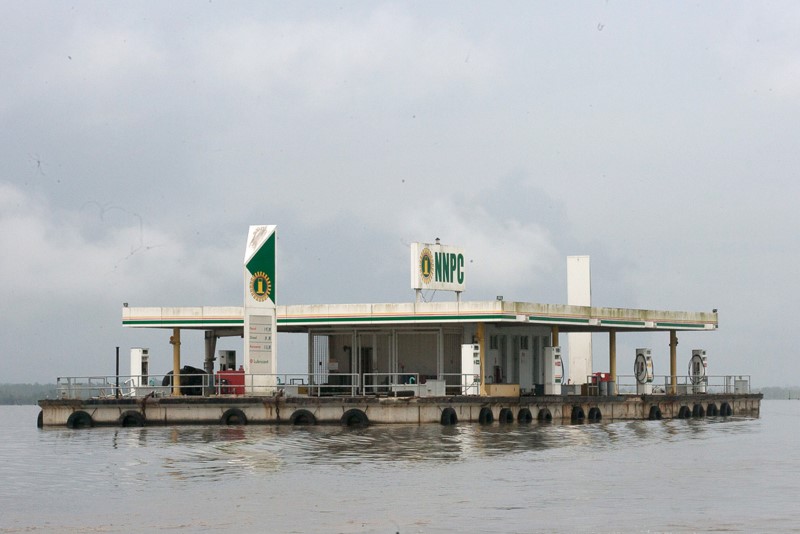By Libby George
LONDON (Reuters) - When OPEC agreed to exempt Nigeria from its oil production-restraint deal last year, it knew the country faced a huge challenge in recouping output lost due to militant unrest.
As tensions subside and the country pumps closer to normal levels, another dilemma looms for the producer group as it continues efforts to eradicate a price-sapping oil glut - how to count Nigeria's crude output without mixing in condensates.
The answer could determine when – and indeed if ever – Nigeria has to cut or curtail oil production, its key source of foreign currency.
While Nigeria promised to cap at 1.8 million barrels per day (bpd) once production "stabilizes", that limit exempts all of the West African nation's condensates. And no one seems to agree on how much of that ultra-light oil it pumps.
"Previously, due to the whole issue of militancy, quotas were not an issue," said Gail Anderson, research director at consultancy Wood Mackenzie. But now, "if you start thinking about OPEC cuts, then the definition of crude and condensate becomes quite important".
Nigeria, along with OPEC peer Libya, was exempt from cuts due to militancy in its Delta region that slashed output from 2.2 million bpd to as low as 1.2 million bpd last year. The attacks have abated, with no major incidents since January.
Nigeria's output has also rebounded, and secondary sources such as consultancies and price-reporting agencies quoted by OPEC said it edged above 1.8 million bpd in August and September - reinstating the country as Africa's largest oil exporter.
But Nigeria has said some of that total included condensates, an ultra-light oil that is not counted as part of its promise to cap.
Oil minister Emmanuel Ibe Kachikwu told Reuters in July that condensates contributed 450,000 bpd to Nigeria's production that month.
The figure exceeds external estimates for condensate production ranging from 200,000 to 250,000 bpd and suggests Nigeria's own condensate definition could keep it out of any cap.
"Definition matters and all producers are playing with definitions," said Ehsan Ul-Haq, director of crude oil and refined products at Resource Economist Ltd, a consultancy.
Neither Nigeria's state oil company, NNPC, nor its Ministry of Petroleum, responded to Reuters requests for comment on its production or definition of condensate.
WHAT'S IN A NAME?
Oil exists in many types of quality – from heavy, sulfur-rich Canadian oil sands to ultra-light shale oil.
Condensates are liquefied once extracted from high-pressure reservoirs, where they exist as a gas. Nearly all oilfields produce some condensates, usually in small amounts. Once it becomes a liquid, there is no widely agreed way to differentiate condensate from crude.
The Organization of the Petroleum Exporting Countries does not publish a figure, reporting only the crude output of its 14 members, and NNPC also publishes no condensate numbers.
Asked how OPEC would define condensate if it needed to determine Nigerian production volumes, a spokesman for the producer group said the definition was based on "international standards" such as those of the American Petroleum Institute.
But those standards focus on whether the oil was a gas when extracted. Once liquefied, there is no widely agreed rule.
Often – including in Nigeria – condensates are blended into crude exports, and not tracked carefully. The issue briefly flared when the U.S. shale revolution led to a spike in oil production, and more would-be exporters sought to send oil abroad as condensate, circumventing a ban on exports of crude. [http://reut.rs/2yzrJA8]
Washington lifted its export ban before it could craft a clearer definition.
This lack of consensus on what constitutes condensate makes it tricky to determine how much any country produces.
"Nigeria does produce quite a bit of condensate, but apart from Akpo it's not really measured because it's blended into crude," Wood Mackenzie's Anderson said.
LABELS AND EXPORTS
Akpo, the only substantial Nigerian grade that trading and analyst sources told Reuters is marketed as condensate, is typically exported at a rate of 100,000-133,000 bpd. Production of another condensate grade, Oso, has declined so substantially that it is blended into Qua Iboe crude exports.
Late last year, the Paris-based International Energy Agency began counting another Nigerian grade, Agbami, with 220,000-250,000 bpd of exports, as condensate. Oil trading and industry sources told Reuters the grade is marketed as crude oil, and the IEA declined to give a reason for the change.
Under IEA figures counting Agbami and Akpo as condensate, Nigeria's crude production has not hit 1.8 million bpd since November 2015.
Despite a contrasting picture from OPEC's secondary-source figures, Nigeria's direct communication with the organization has not shown crude output holding above 1.8 million bpd in the past two years; the country's own full-year 2015 figure was 1.75 million bpd, with that for 2016 at 1.43 million bpd.
Other experts said hitting 1.8 million bpd without Agbami or Akpo would be tough in the near term.
"They would have to ramp up existing production or bring new fields online," said Audrey Dubois-Hebert, senior oil analyst with FGE, an energy consultancy.
Wood Mackenzie estimates that export grades aside, roughly 12 percent of Nigeria's production could be classified as condensate but that it could be higher. This murky, but sizeable, chunk of output could keep Nigeria from capping.
"Having a lot of wellhead condensate production could work to your benefit," Anderson said.
